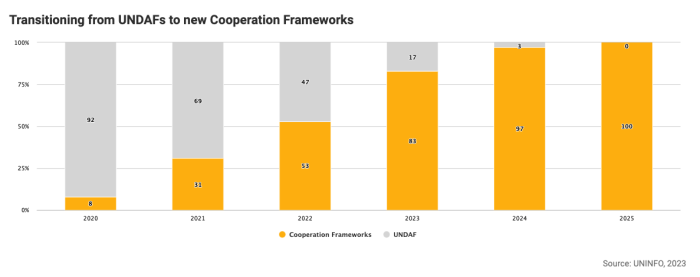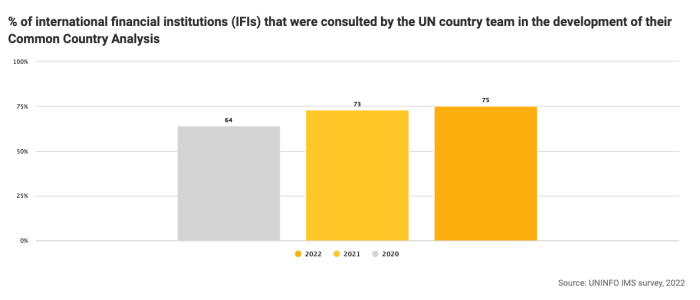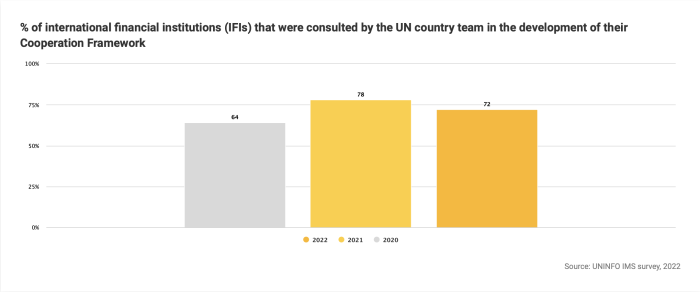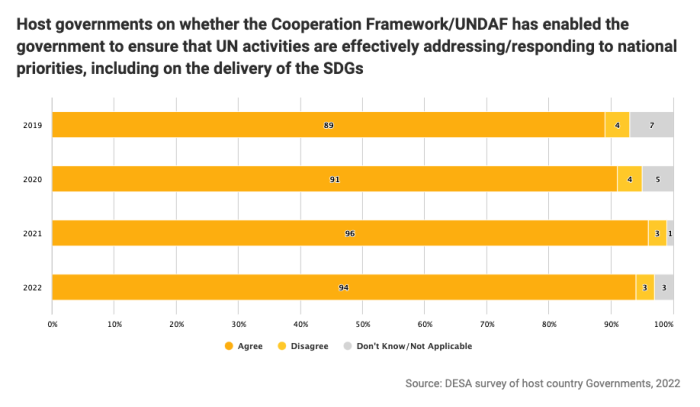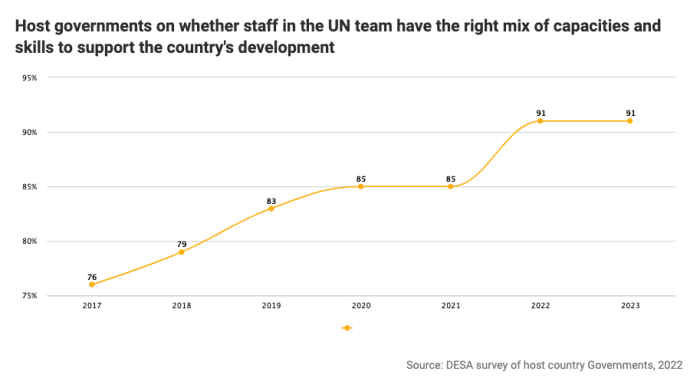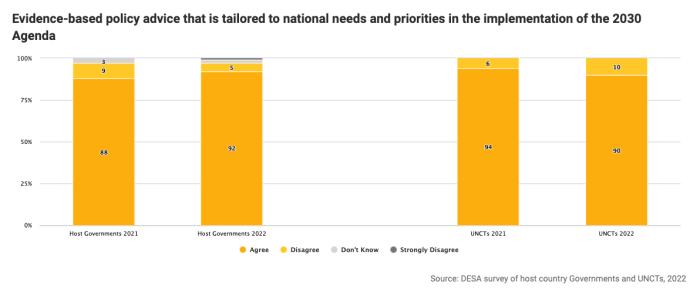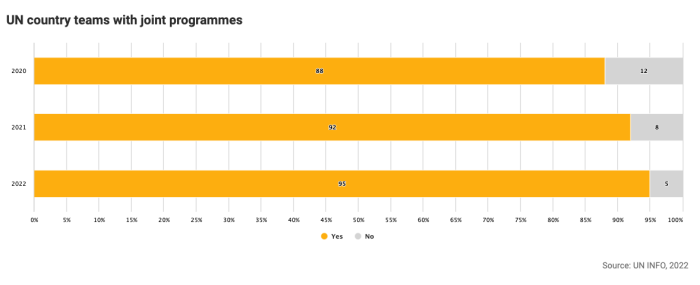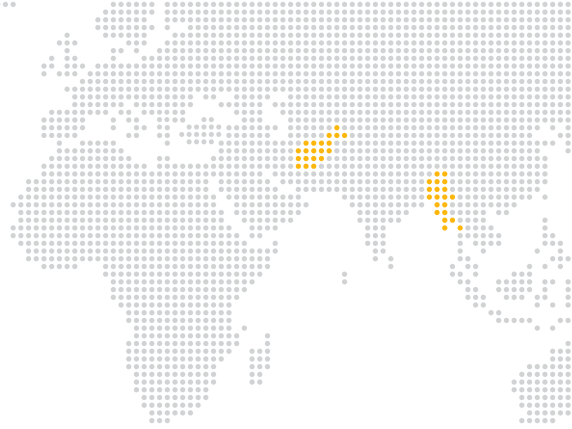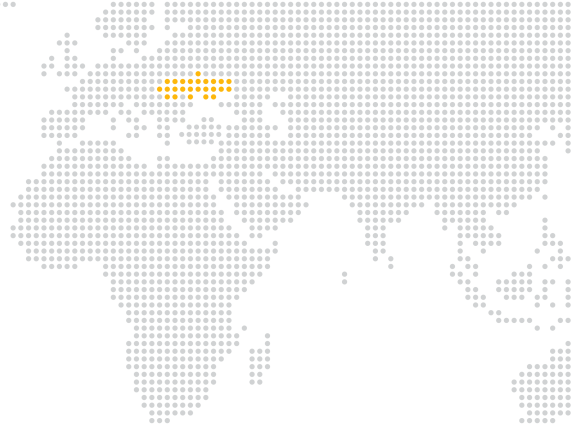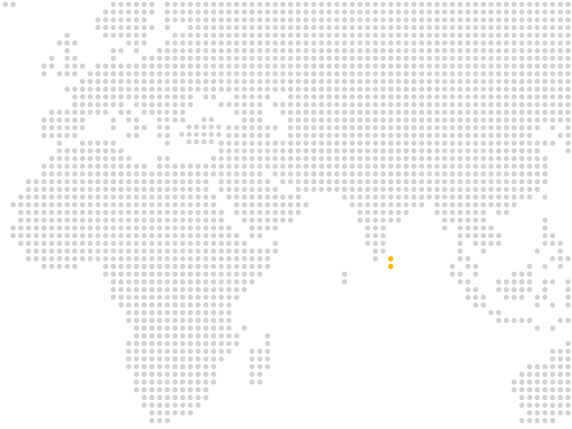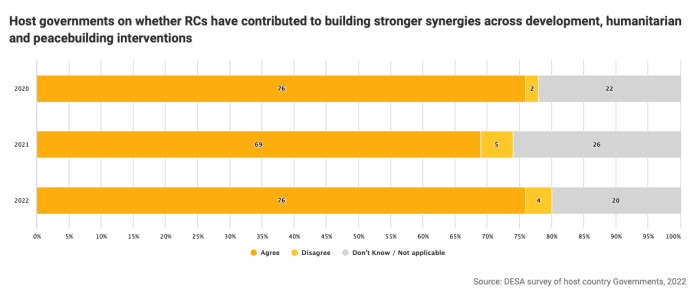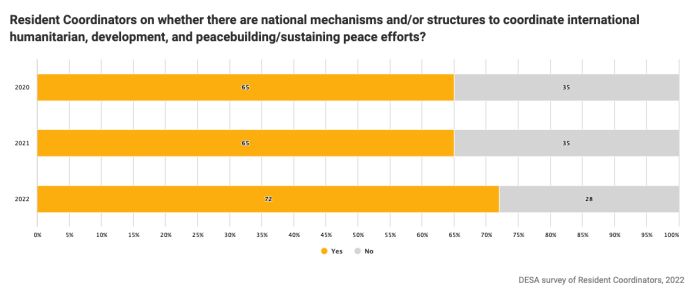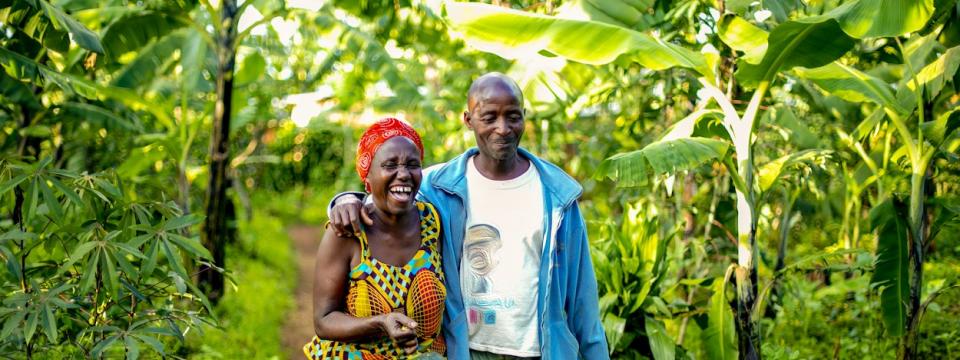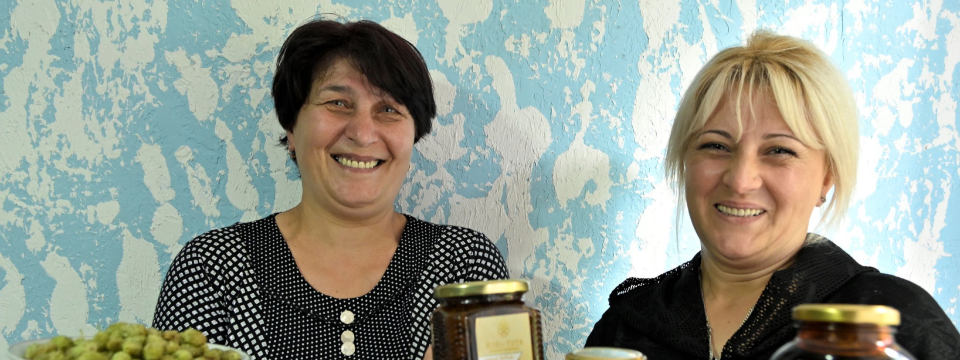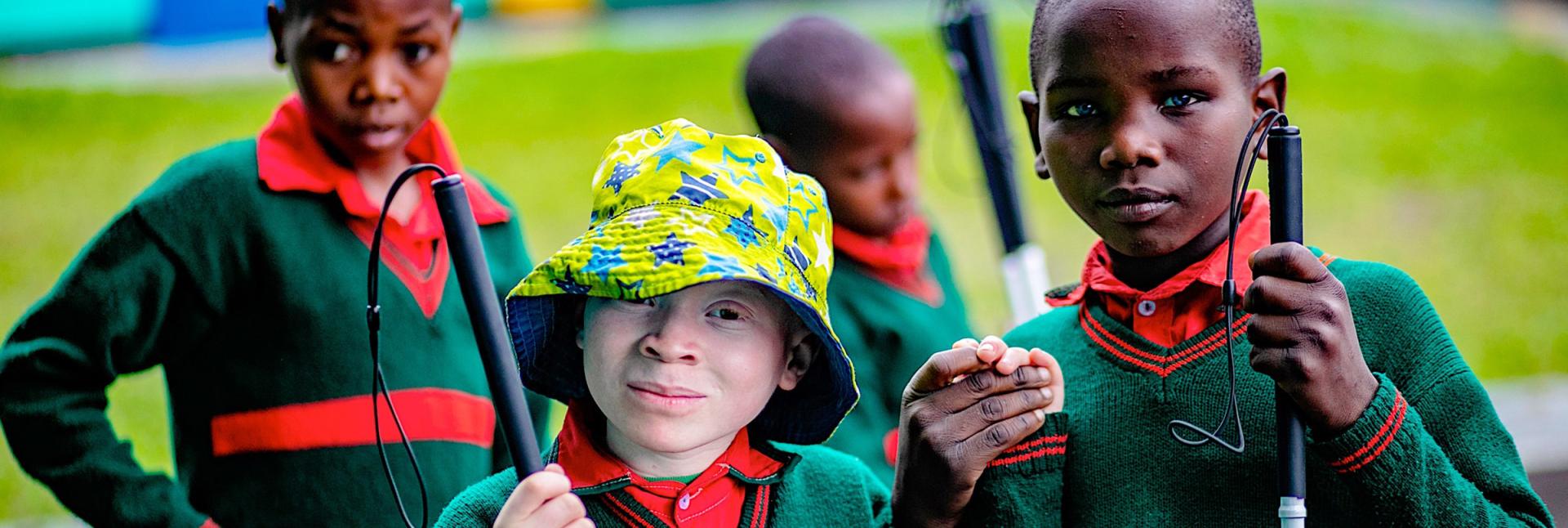
Responses
Integrated and effective responses for the SDGs
The RC system, backed by strong UNDS commitment, continued to foster a more flexible, coherent and effective UN offer aligned with national development priorities and tailored to country settings
Over 50% of UN teams have Cooperation Frameworks
By the end of 2022, over 50% of all UN country teams had transitioned from their old UN Development Assistance Frameworks (UNDAFs) to new UN Sustainable Development Cooperation Frameworks – which are jointly agreed strategic roadmaps by UN teams with host governments to rescue the SDGs in a given timeframe.
Cooperation Frameworks
As of March 2023, 104 Cooperation Frameworks were rolled out – 40 in 2022 alone – working together with governments.
Key to improving the quality of the new UN programming offer is the involvement by RCs of all relevant parts of the UN development system, regardless of where these capacities are based.
In 2022, 87% of host governments said that RCs provide increased ability to access UN expertise, compared to 80% in 2021
Between 2021 and 2022:
- International Trade Centre (ITC) and the Regional Economic Commissions doubled their membership in UN country teams
- UN Conference on Trade and Development (UNCTAD) tripled their participation in UN country teams
- UN Environment Programme (UNEP) increased its participation in UN country teams by almost half
- International financial institutions' (IFIs) participation in preparing Common Country Analyses and Cooperation Frameworks continued to increase
The strengthened UN offer is better tailored to different country settings
Small Island Developing States
- The new Multi-Country Sustainable Development Framework for the Caribbean (2022-2026), and the new multi-country Cooperation Framework for the Pacific (2023-2027) enable a system-wide engagement to help address regional vulnerabilities and needs in many SIDS, with additional focus on country-specificities through complementary Country Implementation Plans.
- In Cabo Verde, the UN Economic Commission for Africa (ECA), the International Telecommunication Union (ITU), UN Conference on Trade & Development (UNCTAD), the World Intellectual Property Organization (WIPO) and the World Bank actively participated in the design of the Cooperation Framework, ensuring a strong offer on trade, e-commerce, innovative financing and digital strategies.
- Resident Coordinators contributed to the meeting of the Alliance of Small Island States (AOSIS) in Antigua and Barbuda in 2022.
Least Developed Countries
- In Zambia, the International Trade Centre (ITC), the World Meteorological Organization (WMO) and the UN Environment Programme (UNEP) lent their expertise to the Cooperation Framework implementation for the first time to fill capacity gaps identified through the Cooperation Framework design process.
- In South Sudan, the International Fund for Agricultural Development (IFAD), ITC, the International Labour Organization (ILO), the UN Office for Disaster Risk Reduction (UNDRR) and the UN Office on Drugs & Crime (UNODC) provided their expertise to the Cooperation Framework implementation for the first time.
- Resident Coordinators contributed to the 5th Least Developed Countries (LDC) Conference in Doha, Qatar.
There is clear evidence that collective programming results are improving
Cooperation Frameworks quality
The 2022 system-wide evaluation of the UN Response to COVID-19 noted the rise in quality and flexibility of the UN offer through more strategic and integrated Cooperation Frameworks, backed by quality joint analysis and drawing from the full UN expertise.
Common Country Analysis quality
A 2022 inter-agency desk review of Common Country Analysis (CCAs) – a type of needs assessment that shapes up the Cooperation Frameworks – noted that the quality of CCAs reflected increased ownership by UN country teams, involvement of a range of partners, and engagement of vulnerable populations.
Cooperation Frameworks evaluations
93% of UN country teams that were due for evaluations of their Cooperation Frameworks/UNDAFs concluded them in 2022 to inform the development of a new Framework.
Host governments have increasingly noticed these improvements in 2022
RCs' strategic support
Over 88% of host governments confirmed that RCs effectively led the delivery of strategic support for national plans and priorities
Host governments on whether the Cooperation Framework/UNDAF has enabled the government to ensure that UN activities are effectively addressing/responding to national priorities, including on the delivery of the SDGs
Source: DESA survey of host country Governments, 2022
of host governments agreed that Cooperation Frameworks were effectively responding to national priorities
Host governments are increasingly satisfied with the policy support provided by UN country teams
Evidence-based policy advice
92% in 2022 vs. 88% in 2021 agreed that the UN adequately provided evidence-based policy advice
Joint-integrated policy advice
86% in both 2022 and 2021 agreed that the UN adequately provided joint-integrated policy advice
Host governments' responses on whether they receive evidence-based policy advice tailored to national needs and priorities
RC leadership and UN country team action underpinned the steady increase in more collective work through joint programmes, supported by pooled funds.
RCs in 69 countries led UN teams to develop new joint programmes on food security and nutrition supported by the Joint SDG Fund.
The number of joint programmes in 2022 nearly doubled compared to 2020. Only 5% of UN teams did not have joint programmes in 2022 (compared to 12% in 2020).
RCs ensured a strong focus on innovative and data-driven programming
Saudi Arabia
Saudi Arabia
In Saudi Arabia, the RCO brought together expertise to support the government with an SDG Data Prioritization tool, which supported the preparation of the Kingdom’s 2023 Voluntary National Review on progress of sustainable development.
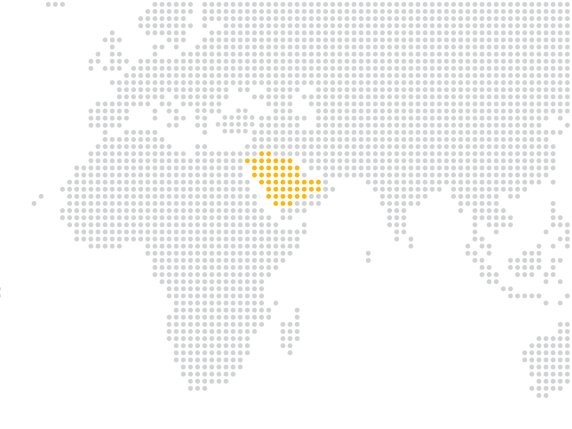
Cabo Verde, Kyrgyzstan, Madagascar, Cambodia
Cabo Verde, Kyrgyzstan, Madagascar, Cambodia
RCs led UNCTs in application of foresight methodologies for Common Country Analyses (CCA) and Cooperation Frameworks in Cabo Verde, Kyrgyzstan, Madagascar, and Cambodia.
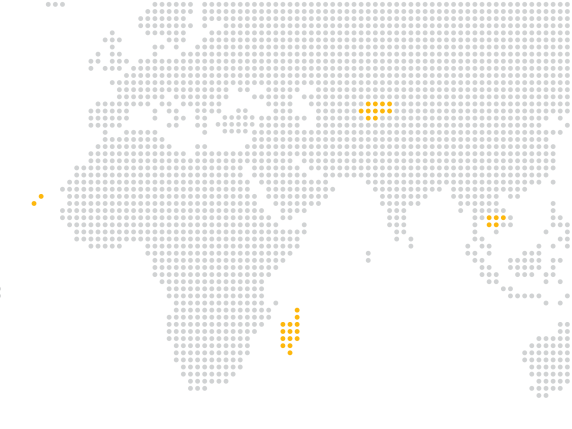
Cabo Verde
Cabo Verde
In Cabo Verde, the use of foresight for a collective visioning of different pathways for SDG achievement, and identification of resources and expertise needed, informed the design of the national development plan and of the Cooperation Framework.
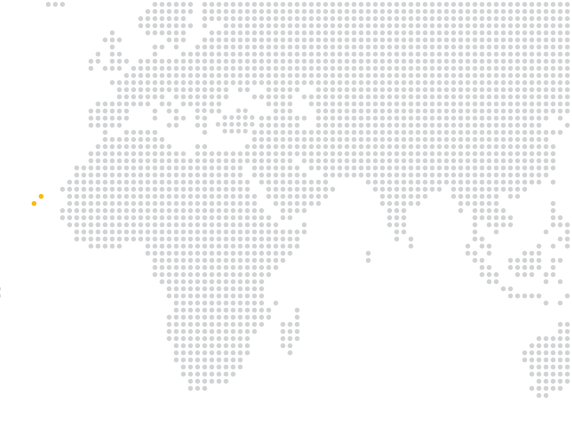
Laos
Laos
In Lao PDR, the RCO supported a “high frequency data” joint programme by the Food and Agriculture Organization (FAO), the UN Development Programme (UNDP), the UN's Children's Fund (UNICEF), the World Health Organization (WHO) and the World Food Programme (WFP) to assess the impact of the ongoing global food, fertilizers, fuel and financial crisis.
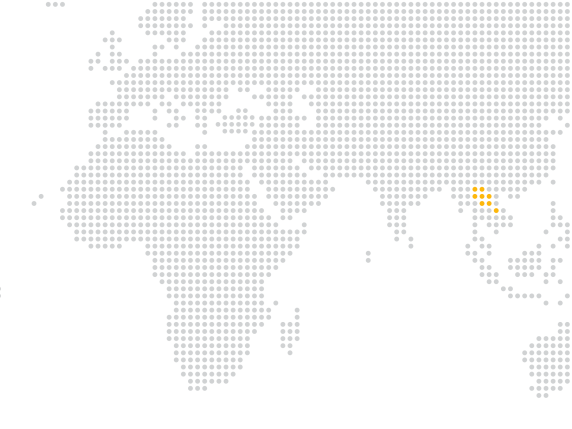
RCs are helping raise the ambition of UN support for countries addressing complex challenges
Pakistan
Pakistan
CCA consultations in Pakistan reemphasized the criticality of the Indus River ecosystem for the country’s development, which underpinned the UN collaboration with the Government on a national masterplan for the Indus River Basin focused on adaptation and climate-resilient growth. The resulting ‘Living Indus’ Initiative is now the biggest climate initiative in the country’s history, spanning economic, environmental and social measures.
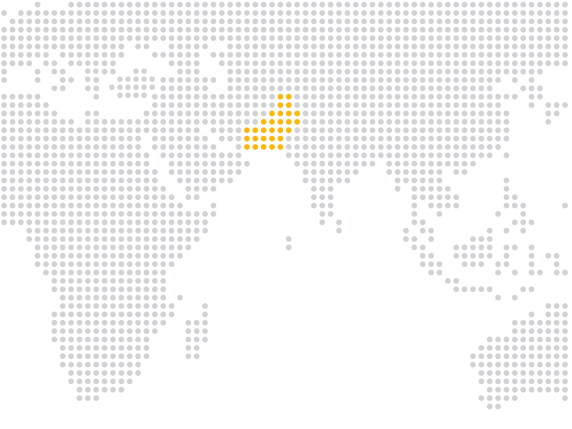
Cambodia
Cambodia
In Cambodia, a joint programme supported by the Joint SDG Fund enabled the UN to operationalize at scale social protection through direct cash transfers to approximately 2.4 million people, pension scheme coverage through digitized services to about 1.5 million people, and the rollout of a National Social Protection Policy Framework, reducing poverty by about 3.4% and catalyzing additional donor funding for sustainable development.
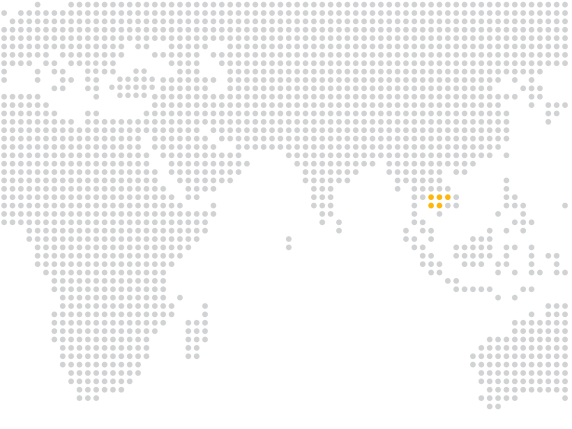
The RC system was on the front lines to shape understanding, mobilize partners and connect national, regional and global resources around global summits, under the Secretary-General’s leadership and the UN Sustainable Development Group's strategic direction.
RC leadership was essential in the preparations for COP27, working closely with the Secretary-General’s Climate Action Team, UNEP, the UN Framework Convention on Climate Change (UNFCC), UNDP and other lead UN entities.
- The role of the RC in Egypt enabled leveraging of country, regional, and global capacities to support the Government in hosting COP27 - as well as unifying the UN offer and linking global prioritization with country-level action.
RCs in over 100 countries worked with the UN Educational, Scientific, and Cultural Organization (UNESCO), UNICEF and other UN team members to mobilize all stakeholder groups to inform national positions for the 2022 Transforming Education Summit. As a result:
- In Bosnia and Herzegovina, the first joint policy position on education was endorsed in 20 years
- In Mongolia, the Government linked the digital education plan and the E-Mongolia public service delivery platform with the work around the Summit.
- In Honduras, a new social compact was created around education that simultaneously responds to national challenges around climate, migration, gender and the humanitarian crisis.
RCs are working with the UN Food Systems Coordination Hub and its regional task forces to drive implementation of national pathways in their countries, following the UN Food Systems Transformation Summit.
RCs partnered with the UN Human Settlements Programme (UN-Habitat) to ensure systematic discussions with governments, UN entities, grassroot organizations and other partners at the World Urban Forum in Poland.
The RC’s initiative spearheaded in support of Indonesia’s inclusion of ocean priorities in the G20 agenda under their presidency led to the adoption of the national Blue Agenda Actions Partnership.
RCs continued to champion gender equality and women’s empowerment, youth engagement, disability inclusion, support for indigenous people and leaving no-one behind.
Gender equality and women’s empowerment
The 2022 assessment of the Spotlight Initiative to eliminate violence against women and girls supported by the European Union emphasized that RC leadership of the UN country team and their engagement of senior stakeholders was one of the most important building blocks in the success of the Initiative.
- In Zimbabwe, with joint efforts of the ILO, the UN Entity for Gender Equality and the Empowerment of Women (UN Women), UNDP, UNESCO, the UN Population Fund (UNFPA), and UNICEF, the Initiative reached over 5 million beneficiaries, established national prevention mechanisms along with equipping law enforcement with state-of-art forensic labs to bring perpetrators to justice, and won the Fortitude Award at the Global Learning Symposium.
In 2022, more than 70 Cooperation Frameworks featured gender equality results while also mainstreaming them across other priorities.
44% of UN country teams joint programme budgets were directed to advancing gender equality and women’s empowerment.
69% of UN country teams used a gender equality marker in joint workplans.
76% of UN country teams reported on the SWAP gender equality scorecard, compared to 61 in 2021.
Youth engagement
RCs have led a steady improvement in meaningful engagement of youth in joint planning processes.
See examples in Thailand, Sierra Leone and Maldives.
Common Country Analyses
90% of Common Country Analyses included a youth analysis
Cooperation Frameworks
80% of Cooperation Framework joint workplans included Youth2030 priorities
Leaving no-one behind
RCs continued to lead UNCTs in supporting national partners in advancing human rights for sustainable development.
In South Sudan, the RC mobilized funding for the UNCT to support the national Women’s Conference, which led to the President signing into law the African Charter for Women’s Rights, the disability and inclusion bill and the climate bill.
In Serbia, joint UN, Government and civil society engagement enabled the Government’s launch of a new legislative tool to ensure that laws and national plans include provisions to protect the most vulnerable.
In Bahrain, joint UNCT technical support led to the adoption of the country’s first National Human Rights Action Plan.
In Chile saw the RC coordinated UNCT support to provide a human rights, gender, and sustainable development perspective to constitutional debates at the request of the Government.
Indigenous people
RCs have been leading the UN country teams’ work in support of indigenous people.
In crisis settings, improved collaboration among the Development Coordination Office (DCO), the Department of Political and Peacebuilding Affairs/Department of Peace Operations (DPPA-DPO) and the Office for the Coordination of Humanitarian Affairs (OCHA) helped Resident Coordinators mobilize assets and expertise from across humanitarian, development and peacebuilding action to advance sustainable development.
Afghanistan and Myanmar
Ukraine
Sri Lanka
Democratic Republic of the Congo
DRC
In DRC, the Deputy Special Representative of the Secretary-General/Resident Coordinator/Humanitarian Coordinator was instrumental in planning and coordinating reconfigured capacities and responses needed to support the government in advancing the SDGs in light of MONUSCO’s transition.
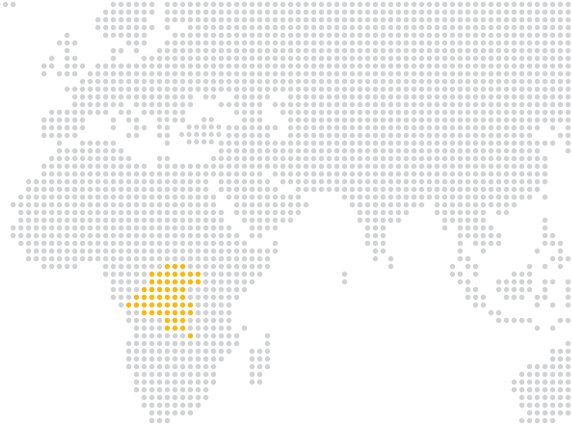
Mongolia
Mongolia
In Mongolia, the Resident Coordinator co-chaired the Humanitarian Country Team with the Chief of the National Emergency Management Agency, developing an early action and response plan to mitigate the impact of extreme climate conditions on livelihoods in the country, estimated to save nearly 75% of livestock.
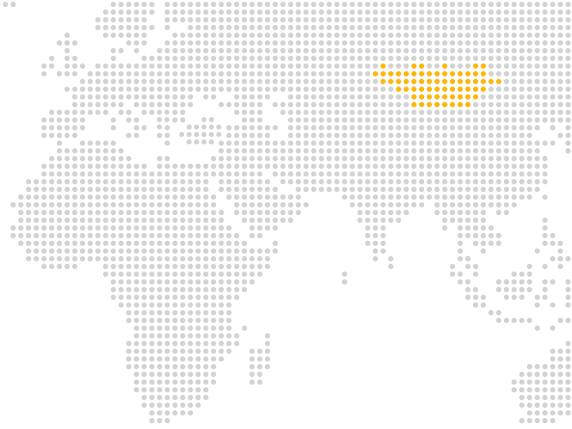
In preparing for and responding to sudden-onset emergencies, the RC system played an especially critical role in countries where there is no presence of OCHA.
Cuba
Cuba
In Cuba, in response to Hurricane Ian, the RC quickly mobilized the UNCT to develop a Plan of Action, mobilizing nearly $15 million for immediate assistance and recovery.
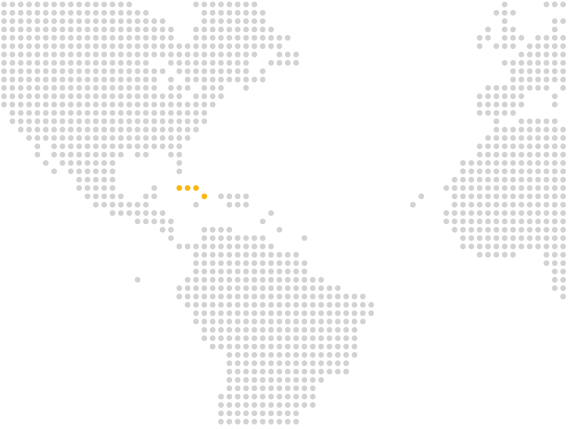
Barbados & Eastern Caribbean Countries
Barbados and Eastern Caribbean Countries
The RC in Barbados and the Eastern Caribbean, with the UN Office for Disaster Risk Reduction (UNDRR) and the World Meteorological Organization (WMO), hosted the launch of the global UN Early Warning for All initiative in the Caribbean.
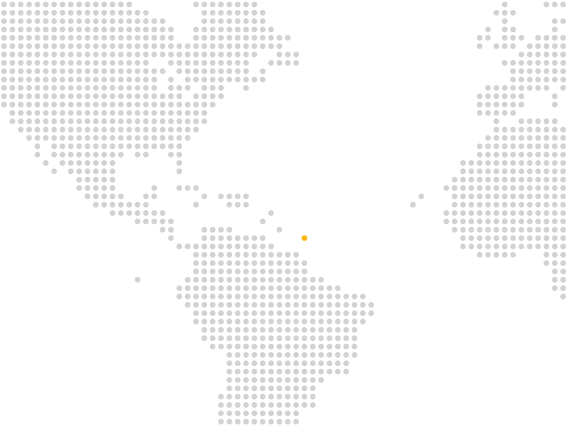
MCO countries
MCO countries
Countries covered by a Multi-Country Office (MCO), like Vanuatu and St. Vincent and the Grenadines, benefited greatly from new Country Coordination Officers deployed through the reforms, who quickly responded and coordinated the UN’s disaster response.
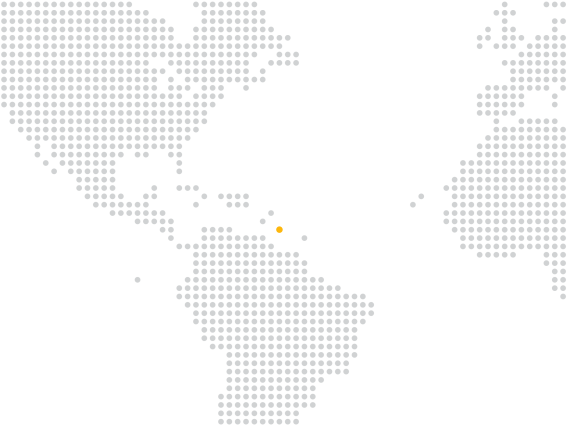
As a result, national mechanisms and/or structures to coordinate international development, humanitarian and peacebuilding efforts have increased steadily in majority of countries.
The report's resource page can be found here, and the glossary here.
To learn more, visit un-dco.org.














